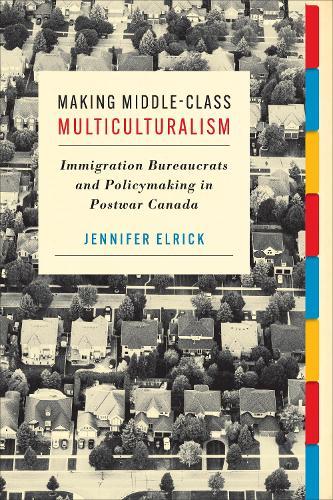Awards
- Commended for 2022 Seymour Martin Lipset Best Book Award from the Canadian Politics section of the American Political Science Association 2022 (Canada)
- Short-listed for 2022 Donald Smiley Prize awarded by The Canadian Political Science Association 2022 (Canada)
Overview
Making Middle-Class Multiculturalism re-interprets the historiography of the emergence of Canada's universal immigration policy for skilled workers and family immigrants in the 1950s and 1960s. In the 1950s and 1960s, immigration bureaucrats in the Department of Citizenship and Immigration played an important yet unacknowledged role in transforming Canada's immigration policy. In response to external economic and political pressures for change, high-level bureaucrats developed new admissions criteria gradually and experimentally while personally processing thousands of individual immigration cases per year. Making Middle-Class Multiculturalism shows how bureaucrats' perceptions and judgements about the admissibility of individuals - in socioeconomic, racial, and moral terms - influenced the creation of formal admissions criteria for skilled workers and family immigrants that continue to shape immigration to Canada. A qualitative content analysis of archival documents, conducted through the theoretical lens of a cultural sociology of immigration policy, reveals that bureaucrats' interpretations of immigration files generated selection criteria emphasising not just economic utility, but also middle-class traits and values such as wealth accumulation, educational attainment, entrepreneurial spirit, resourcefulness, and a strong work ethic. By making ""middle-class multiculturalism"" a demographic reality and basis of nation-building in Canada, these state actors created a much-admired approach to managing racial diversity that has nevertheless generated significant social inequalities.
Full Product Details
Author: Jennifer Elrick
Publisher: University of Toronto Press
Imprint: University of Toronto Press
Dimensions:
Width: 15.20cm
, Height: 1.30cm
, Length: 22.90cm
Weight: 0.320kg
ISBN: 9781487527785
ISBN 10: 1487527780
Pages: 277
Publication Date: 10 January 2022
Audience:
Professional and scholarly
,
College/higher education
,
Professional & Vocational
,
Tertiary & Higher Education
Format: Paperback
Publisher's Status: Active
Availability: Temporarily unavailable

The supplier advises that this item is temporarily unavailable. It will be ordered for you and placed on backorder. Once it does come back in stock, we will ship it out to you.
Reviews
Making Middle-Class Multiculturalism is a must-read for anyone seeking to understand Canada's move from race-based to skills-based immigrant admissions. Based on meticulous archival research on bureaucrats' decision-making practices, Jennifer Elrick compellingly shows how in the postwar era class came to mediate the impact of race on immigrant selection. This book will be an instant classic in the field of Canadian immigration policy. - Antje Ellermann, Professor of Political Science and Founding Director, Centre for Migration Studies, University of British Columbia In this outstanding book, Jennfier Elrick shows how government officials in postwar Canada engendered a major shift from a race-based, white-settler approach to a multicultural model in the space of just fifteen years. This is a hugely original and important contribution, which both challenges our understanding of Canada's brand of multiculturalism, and encourages us to rethink the role of government in immigration.. - Christina Boswell, Professor of Politics, University of Edinburgh This terrific book draws back the curtain on how case-by-case decisions on who to let in and who can stay - in opposition to official entry and deportation regulations - helped reshape Canada's immigration policy to be colour-blind and centred on economic merit. Beyond the Canadian story, Elrick shows that changes in immigration law are not just about politics, foreign-relations, and economic pressures, but also lie in the culturally infused boundary work of civil servants, who can shut people out but also nudge doors open. - Irene Bloemraad, Class of 1951 Professor of Sociology and Chair of Canadian Studies, University of California, Berkeley
""This terrific book draws back the curtain on how case-by-case decisions on who to let in and who can stay - in opposition to official entry and deportation regulations - helped reshape Canada's immigration policy to be colour-blind and centred on economic merit. Beyond the Canadian story, Elrick shows that changes in immigration law are not just about politics, foreign-relations, and economic pressures, but also lie in the culturally infused boundary work of civil servants, who can shut people out but also nudge doors open."" --Irene Bloemraad, Class of 1951 Professor of Sociology and Chair of Canadian Studies, University of California, Berkeley ""In this outstanding book, Jennfier Elrick shows how government officials in postwar Canada engendered a major shift from a race-based, white-settler approach to a multicultural model in the space of just fifteen years. This is a hugely original and important contribution, which both challenges our understanding of Canada's brand of multiculturalism, and encourages us to rethink the role of government in immigration.."" --Christina Boswell, Professor of Politics, University of Edinburgh "" Making Middle-Class Multiculturalism is a must-read for anyone seeking to understand Canada's move from race-based to skills-based immigrant admissions. Based on meticulous archival research on bureaucrats' decision-making practices, Jennifer Elrick compellingly shows how in the postwar era class came to mediate the impact of race on immigrant selection. This book will be an instant classic in the field of Canadian immigration policy."" --Antje Ellermann, Professor of Political Science and Founding Director, Centre for Migration Studies, University of British Columbia
Author Information
Jennifer Elrick is an assistant professor in the Department of Sociology at McGill University.




